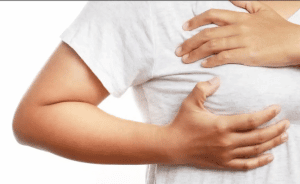Breast engorgement is a condition when the breasts swell and become uncomfortable and tender.
For every mother, feeding is a unique experience. But it also has its fair share of drawbacks.
The problem of breast engorgement is one of them.
Breast engorgement can make your breasts stiff, which will make it much more challenging for you to nurse your baby. However, several simple home remedies can be used to cure the signs and symptoms of breast engorgement.
Learn more about what breast enforcement is, its causes, and the home remedies by reading on.

What is breast engorgement?
Breast engorgement occurs when there is an overabundance of milk and the breasts swell, harden, and hurt.
Breast engorgement is a typical occurrence, with most new mothers experiencing it 3-5 days after giving birth. Blood and lymphatic fluids are two other fluids that may be present in engorged breasts.
Causes of breast enforcement
It’s a good idea to be ready even if you haven’t yet encountered engorgement in case you do at some point.
After childbirth, the breasts experience increased blood flow, lymph fluids, and milk production.
As a result, the breasts become engorged, feeling heavy, hard, and sometimes uncomfortable.
Within the first week after giving birth, engorgement is not unusual.
If your baby starts eating solid foods or demands fewer feedings, or if their feeding routine otherwise changes, you might also notice it.
Read also: Breast Discharge – Why is my breast bringing out water?
Alternatively, any of the following conditions could result in breast engorgement:
- Skipping a nursing session and not pumping
- An overabundance of breast milk
- waiting too long between nursing and/or pumping sessions
- Inappropriate draining of breast milk and poor latching.
- The inability of the baby to feed due to infant illness or disease.
Signs of breast enforcement

Breast engorgement often lasts for a short time and goes away as your body changes the amount of breast milk you produce to meet your baby’s demands.
You will experience the following signs when your breasts are engorged:
- The heaviness of the breast is brought on by the breasts becoming overfilled with milk.
- When caressing the breasts, you can also feel tenderness, throbbing, and a little bit of discomfort.
- The breast tissue seems rigid and unyielding to the touch.
- The skin is stretched externally as a result of the underlying breast tissue becoming engorged.
- Even though the rest of your body is normal, you could notice that your breasts are warmer to the touch.
- A small lymph node inside the armpit is also slightly enlarged, along with mild underarm swelling.
What is the treatment for engorged breasts?
There isn’t a precise cure for engorged breasts, however, if the pain is unbearable, you might want to try ibuprofen.
The baby is unaffected by these medications and they are suitable for breastfeeding.
These medications may also be recommended by your doctor to lessen engorgement.
Read also: Safety Tips For Road Trips During Pregnancy
To relieve breast engorgement, nevertheless, taking care of the condition at home is probably enough.
Home Remedies For Engorged Breasts
Here are some home remedies for engorged breasts:
1. Massage the breast gently
Gently massage your breast in short, soft strokes from the chest to the nipple.
If the breasts are not in pain, gently massage them in a circular motion. Massage enhances circulation and facilitates improved milk flow through the nipple.
2. Cold compress and warm shower:
To feel better, use an ice pack (not actual ice) for 15 to 20 minutes to the area of engorgement.
To increase milk flow and lessen breast stiffness, take a warm shower
3. Increase feedings:
Newborns typically require 8 to 12 feeds per day.
If for some reason there are fewer feeds than normal, try gradually increasing them this will serve as a remedy for breast engorgement.
4. Leafy cabbage may be useful
There are numerous anecdotal reports of mothers who found relief by placing a cooled cabbage leaf inside the bra.
Before putting the cabbage leaf in the fridge to cool, clean it.
Place it in the affected breast’s bra cup and wait until it warms up or begins to wilt. Some suggest that cabbage leaves may be able to reduce breast engorgement. According to experts, it is a safe home cure worth trying.
How to prevent breast engorgement.
In the first few days following delivery, breast engorgement is unavoidable.
You can make too much milk until your body learns how to control it.
However, by using these strategies and tips, you can stop future cases of breast engorgement:
- routinely feed or pump:
Whenever you are nursing, your body continues to produce milk.
Every one to three hours, at the very least, breastfeed your infant.
If you’re not home or your baby isn’t hungry, pump.
- To reduce supply
use ice packs. Ice packs and cold compresses may assist decrease milk production in addition to relaxing and cooling inflammatory breast tissue.
This is because the cool packs disable the signal that causes your body to produce more milk, or “let down,” in your breasts.
Read also: Is it good for a pregnant woman to drink milo during pregnancy?
- Little breast milk should be removed
You can hand express some breast milk or pump a little bit if you need to release some pressure.
But be careful not to overexpress or pump. It can backfire on you, and your body might try to make up for what you just took away by making extra milk.
- Wean gradually
Your weaning strategy could go awry if you discontinue nursing too quickly. There’s a chance you’ll drink too much milk.
To help your body acclimate to the lessened need, wean your child gradually.
When weaning, how long does engorgement last?
How long weaning takes will determine how long engorgement lasts. Breast engorgement pain can last up to a week after abruptly stopping breastfeeding.
In conclusion,
Although breastfeeding is a wonderful experience, breast engorgement can make it difficult and discouraging. Hey mom, try not to give up.
Breast engorgement is common and only transitory; you shouldn’t be concerned because your milk supply will comfort you.
Enjoy the journey mom.
